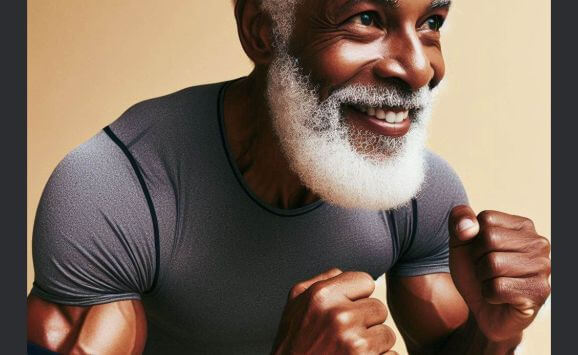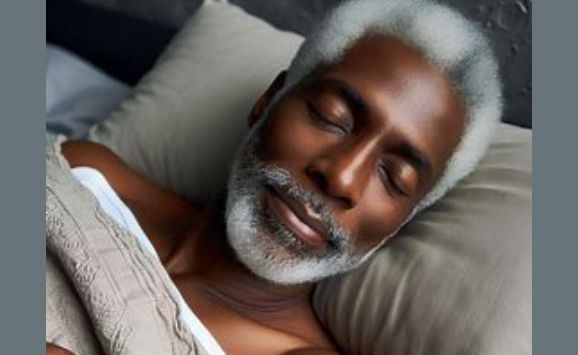Getting older doesn’t mean feeling weaker or looking worn out. The right daily healthy habits can help you stay strong, sharp, and full of energy.
Small changes in how you eat, move, and rest can add years to your life while keeping you looking and feeling younger.
Want to avoid common health problems and keep up with your active lifestyle?
These five healthy habits can boost your heart, brain, and overall well-being.
Whether it’s nutrition, exercise, or stress management, simple changes can make a big difference.
By prioritizing these habits, senior men can engage in their desired hobby, become useful and not a burden to society, and live a healthier and more fulfilling life.
Start now, and give yourself the best chance at a longer, healthier life.
Recommended: 6 Foods Men Should Run Away From
You might want to pin the image below.

Key Takeaways
- Balanced nutrition, including whole grains, lean proteins, and colorful fruits and vegetables, is vital.
- Regular physical activity, such as aerobic exercises and strength training, supports cardiovascular and muscle health.
- Mental and emotional wellness, through social engagement and stress management, are equally important.
- Preventive health screenings, like prostate exams and cardiovascular screenings, are key for early detection.
Recommended: Medical-grad Compression Socks for Senior Men
Relationship Between Healthy Habits and Longevity
Living longer and feeling better isn’t about extreme changes, it’s about simple habits that add up over time.
Regular exercise, eating well, staying smoke-free, drinking in moderation, and keeping a healthy weight can add years to your life.
Research shows that men who follow at least four of these habits by 50 live up to 10 years longer.
Add good sleep and strong social connections by 40, and you could gain even more—up to 24 extra years. Every small change matters.
The sooner you start, the bigger the impact. Ready to make choices your future self will thank you for?
Related: Insights of Late Fatherhood
5 Healthy Habits that Make Older Men Live Longer
We have curated 5 key healthy habits that can make an older man live longer and happily without becoming a burden to people around him.
- Balanced nutrition
- Regular physical activity or exercise
- Mental and emotional wellness
- Preventive health screening
- Good sleep
Let’s examine them one after the other:
Recommended: Best Skincare Options for Older Men with Sensitive Skin
Balanced Nutrition for Older Men

Balanced nutrition is one of the healthy habits that make older men live longer.
As aging naturally alters the body’s metabolism and nutritional needs, special attention must be paid to ensure optimum dietary intake by older men.
Here are some balanced nutrition tips to make older men live longer and younger:
1. Whole grains and fiber
A diet rich in whole grains and fiber plays a central role in promoting digestive health and mitigating the risk of chronic diseases for older men.
Whole grains like brown rice, oats, and barley are powerhouses of needed nutrients to arrest and control blood sugar levels and support heart health.
2. Lean proteins and omega-3 fatty acids
Also, lean proteins and omega-3 fatty acids are important in contributing to heart and brain health for older men.
Adding sources of lean proteins such as chicken, turkey, and legumes helps in muscle maintenance and repair, which the older man needs to remain physically active.
Also, omega-3 fatty acids, prevalent in fish such as salmon and mackerel, are known for their anti-inflammatory properties and benefits in mitigating cognitive decline.
3. Calcium and vitamin D
Every older man should prioritize the intake of adequate calcium and vitamin D which are indispensable for bone health, particularly as older men face an increased risk of osteoporosis and fractures.
Sources of calcium include dairy products like milk and yogurt, while vitamin D can be derived from sunlight exposure and fortified foods.
Consuming these nutrients regularly can aid in maintaining bone density and overall skeletal health.
5. Colorful fruits and vegetables
The nutritional value of colorful fruits and vegetables should be leveraged by older men.
These foods are rich in vitamins, minerals, and antioxidants that help immune function and disease prevention.
Berries, leafy greens, and bell peppers should form a staple part of older men’s diet.
6. Healthy fats and minimizing processed foods
Adding healthy fats while reducing the intake of processed foods is important for senior men.
Avocados, nuts, and olive oil are reliable sources of healthy unsaturated fats that support heart health and minimize inflammation.
On the contrary, processed and refined foods which are dangerous to health should be eliminated from older men’s menus, because of their high content of unhealthy fats, sugars, and additives, which contribute to chronic health issues.
Related: 6 New Longevity Health Hacks for Men
Regular Physical Activity for Senior Men

Another healthy habit that makes older men live longer is regular physical activity. This cannot be over-emphasized.
As one age, the body’s natural processes gradually slow down, making an active lifestyle a must for sustaining vitality.
A combination of aerobic activities, strength training, and flexibility exercises can collectively promote cardiovascular health, enhance muscle mass, and support joint function.
Let’s take a closer look:
1. Aerobic activities for cardiovascular health
Aerobic activities such as walking, swimming, and cycling are highly effective in improving the cardiovascular health of senior men.
These exercises quicken the heart rate, improve blood circulation, and can reduce the risk of dangerous conditions like heart disease and diabetes.
An older man should aim for at least 150 minutes of moderate-intensity aerobic activity per week to keep the cardiovascular system robust.
2. Strength training for muscle and bone health
Strength is also important for senior men. Engaging in muscle-strengthening activities at least two days a week can help sustain muscle mass and bone density, improving metabolic health.
Resistance exercises, such as lifting weights or using resistance bands, can be particularly beneficial.
These exercises can halt muscle loss, which is a common issue as men age, and aid in maintaining an optimal metabolic rate.
Recommended: Men’s Health and Wellness
3. Flexibility exercises for joint health
Flexibility exercises, including activities like yoga and stretching routines, are vital for joint health and injury prevention.
Regular stretching can enhance the range of motion, decrease the risk of falls, and alleviate stiffness in joints.
Flexibility routines should be incorporated into the exercise regimen at least three to four times a week to ensure joints remain supple and functional.
4. Setting realistic goals and consulting healthcare providers
Older men need to set realistic fitness goals tailored to their individual abilities and health status.
Starting with manageable targets and gradually increasing intensity and duration can lead to sustainable improvements in fitness levels.
Moreover, consulting healthcare providers before embarking on any new exercise regimen is crucial.
Medical advice ensures that the chosen physical activities are safe and appropriate, minimizing the risk of injury.
Related: Common Fears of Senior Men
Mental and Emotional Wellness

Mental and emotional health are essential components of longevity, especially for older men.
To live long and younger, senior men should engage in the following mental and emotional activities:
1. Social activities and relationships
For older men, engaging in social activities and maintaining relationships play a vital role in enhancing mental well-being and can significantly reduce the risk of depression and anxiety.
Regular interaction with friends, family, and community groups fosters a sense of belonging, provides emotional support, and encourages positive mental health.
2. Continuous learning and brain stimulation
In addition to social engagement, continuous learning, and brain stimulation are central for older men who desire to live longer.
Participating in activities such as puzzles, reading, and picking up new hobbies can keep the mind sharp, active, and younger.
These activities not only stimulate cognitive functioning but also provide a sense of accomplishment and purpose.
3. Stress management techniques
Managing stress effectively is another critical area of mental and emotional health that senior men should take seriously to live and feel younger.
Techniques such as mindfulness and meditation can lead to a more balanced life.
Mindfulness, the practice of staying present and fully engaging with the current moment, can significantly reduce stress levels.
Also, its sister, meditation offers time to relax the mind, promoting emotional clarity and reducing anxiety.
4. Routine mental health check-ups and seeking professional help
Older men must take serious, routine mental health check-ups.
Regular consultations with mental health professionals can help detect any issues early and provide appropriate interventions.
Seeking professional help should always be viewed as a strength rather than a weakness.
Related: Overcoming Loneliness By Older Men
Preventive Health Screenings

Preventive health care is a bedrock of maintaining wellness, living longer, and feeling younger, particularly for older men.
Regular check-ups and preventive measures are instrumental in identifying and managing potential health issues at an early stage, which helps for long-term health and quality of life.
For men over 50, certain health screenings become especially vital.
1. Prostate Exams
Every older man should routinely have prostate exams, one of the key screenings and healthy habits that make older men live longer.
Prostate cancer is a common concern in older men, and early detection through regular screenings can help treatment outcomes.
A prostate-specific antigen (PSA) test, along with a digital rectal examination (DRE), can help detect abnormalities early on.
2. Colonoscopy
Another screening every older man should take seriously is colonoscopy.
The risk of colon cancer increases with age, and a colonoscopy every ten years starting at age 50 is generally advised.
This procedure allows for the detection and removal of precancerous polyps, thereby preventing the development of colon cancer.
3. Cardiovascular Screening
Cardiovascular screenings are also not to be forgotten. Heart disease is a leading cause of death among older men, making it critical to monitor blood pressure, cholesterol levels, and other cardiovascular markers.
Regular check-ups should include these screenings to mitigate risks and implement timely interventions if necessary.
Related: How Older Men Can Cope with Financial Insecurity
Preparation for these Screenings
Preparation for these screenings involves some steps to ensure accurate results and a better experience.
Generally, fasting may be required before blood tests. For a colonoscopy, a bowel preparation regimen is mandatory.
It’s important to consult with your healthcare provider for specific instructions well ahead of time.
Adopting a proactive approach to health care by staying informed and actively participating in health screenings can make a significant difference.
Understanding the importance of these evaluations and incorporating them into your routine can lead to early identification of potential issues, better management of existing conditions, and ultimately, a healthier life in the long term.
Related: Who is an Older Gentleman?
Good Sleep

For older men, quality sleep is not just a luxury; it’s a vital habit that can significantly impact longevity.
The Science Behind Sleep and Longevity
Research consistently shows that adequate sleep is linked to a longer, healthier life.
Sleep plays a central role in various bodily functions, including immune system health, cognitive function, and emotional regulation.
For senior men, who may face increased health challenges, good sleep can help mitigate risks associated with chronic conditions such as heart disease, diabetes, and obesity.
Benefits of Quality Sleep
- Improves memory, concentration, and problem-solving skills, keeping older men mentally sharp.
- Reduces the risk of anxiety and depression, supporting emotional health.
- Regulates hormones that control appetite and metabolism, aiding in weight management and reducing chronic disease risk.
- Essential for muscle recovery and repair, especially for active older men.
Tips for Better Sleep
- Go to bed and wake up at the same time daily.
- Keep the bedroom dark, quiet, and cool.
- Avoid screens at least an hour before bed to prevent melatonin disruption.
- Steer clear of heavy meals, caffeine, and alcohol before bedtime.
Frequently Asked Questions
What helps elderly live longer?
Regular exercise, even light activity, helps elderly men live longer, with active men living up to 5 years longer than sedentary men.
What are the 5 things to do everyday to live longer?
To live longer, men should: exercise regularly, avoid smoking, maintain a healthy weight, eat a nutritious diet, and manage stress.
How males can improve life expectancy?
Men can improve life expectancy by exercising regularly, avoiding smoking, maintaining a healthy weight, eating well, and managing stress.
Final Words from Gentsways
It’s not news that healthy habits make older men live longer and younger.
By putting first, balanced nutrition, regular physical activity, mental and emotional wellness, and preventive health screenings, older men can lead healthier and more fulfilling lives.
Adopting a diet rich in whole grains, lean proteins, and colorful fruits and vegetables, engaging in aerobic and strength training exercises, nurturing social connections, and undergoing regular health screenings are essential components of a comprehensive health regimen.
Pyo Merez is a men’s lifestyle enthusiast and writer about the gentleman’s place and impact on society. Raised by a distinguished gentleman dad, he offers unique insights into how the mind of a gentleman works and how societal norms shape gentlemen’s identity and vice versa.
Through his insightful articles, Pyo taps into the depths of gentleman culture to provide perspectives on etiquette and manners in modern society.

